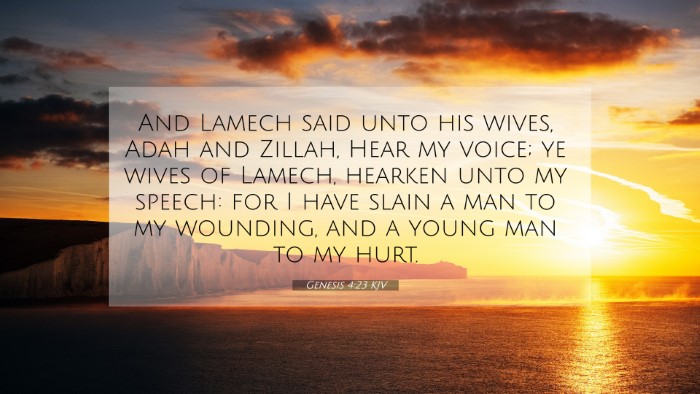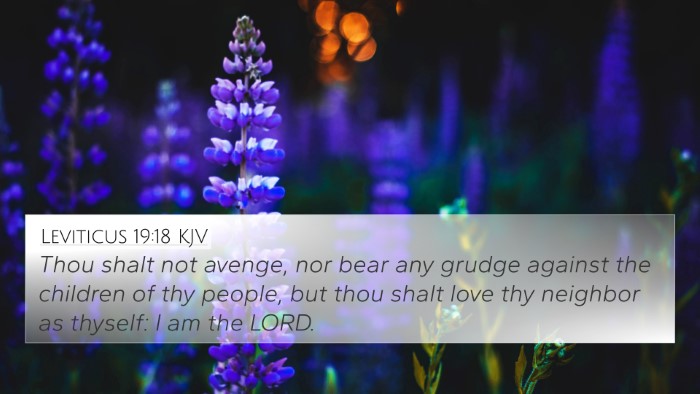Understanding Genesis 4:23
Genesis 4:23 states: "And Lamech said to his wives, 'Adah and Zillah, hear my voice; You wives of Lamech, listen to my speech! For I have killed a man for wounding me, Even a young man for hurting me.'" This verse captures a significant moment in the early narrative of humanity, showcasing the themes of violence and the burgeoning morality of mankind.
Summary and Context
In this passage, we see Lamech, a descendant of Cain, expressing a perverse pride in his violent actions. This moment bears witness to the escalation of violence since Cain's murder of Abel and suggests a deeper degeneration of moral values.
Commentary Insights
- Matthew Henry:
Henry emphasizes the ominous nature of Lamech's declaration, noting that he not only acknowledges his violent act but does so with boastfulness. This reflects a society moving away from God’s original intention for humanity, descending further into moral decay.
- Albert Barnes:
Barnes points out that Lamech’s words represent a drastic increase in the hatred and vindictiveness originating from the family of Cain. This shift from the guilty sorrow of Cain to the pride of Lamech signifies the qualitative change in human responses to violence.
- Adam Clarke:
Clarke offers a theological perspective, likening Lamech’s justification of murder to a misplaced sense of justice. He also interprets Lamech’s declaration within the context of the cultural evolution of violence and revenge in early civilization.
Thematic Connections
This verse’s themes of violence and retribution are intricately woven into the biblical narrative. It sets up contrasts that can be traced throughout Scripture.
Bible Cross-References
- Genesis 4:8 - The murder of Abel by Cain, showcasing the origins of human violence.
- Genesis 6:11-13 - The corruption of humanity before the flood, expanding on the pervasive sinfulness that led to divine judgment.
- Exodus 21:24 - The law of retaliation, "eye for eye," reflects a codification of justice that Lamech seems to reject in favor of personal vengeance.
- Numbers 35:31 - Further elaboration on the seriousness of murder and the requirement for accountability that stands against Lamech's pride.
- 1 John 3:12 - An admonition against Cain's actions re-emphasizes the moral decline represented by Lamech's declaration.
- Romans 12:19 - A New Testament directive to refrain from vengeance, contrasting the culture of prideful retribution seen in Lamech’s speech.
- Matthew 26:52 - Jesus teaches about the futility of violence, which serves as a critical counter-narrative to Lamech's pride.
Inter-Biblical Dialogue
The concepts presented in Genesis 4:23 are echoed throughout Scripture, establishing connections between the violence and moral decay of early humanity and later admonitions against such behaviors. In the New Testament, Jesus and the Apostles articulate a radical shift from revenge to forgiveness, providing a clear scriptural cross-reference that serves as a corrective to Lamech’s boastfulness.
Practical Applications
Studying Genesis 4:23 through the lens of cross-referencing offers invaluable insights for believers today:
- Understanding the roots of sin: Reflect on how vengeful attitudes manifest in society and personal relationships.
- Emphasizing forgiveness: Seek to embody the teachings of Jesus in countering the cycle of violence.
- Preparation for sermons: Connect the narrative of Lamech to contemporary issues of violence and justice in community discussions.
Conclusion
The narrative of Lamech in Genesis 4:23 serves as a poignant reminder of humanity's propensity toward violence and the need for divine guidance in moral conduct. As we engage with this text and its related scriptures, we find a rich tapestry of themes that resonate throughout the Bible, driving home the importance of understanding our actions within the broader narrative of redemption.






